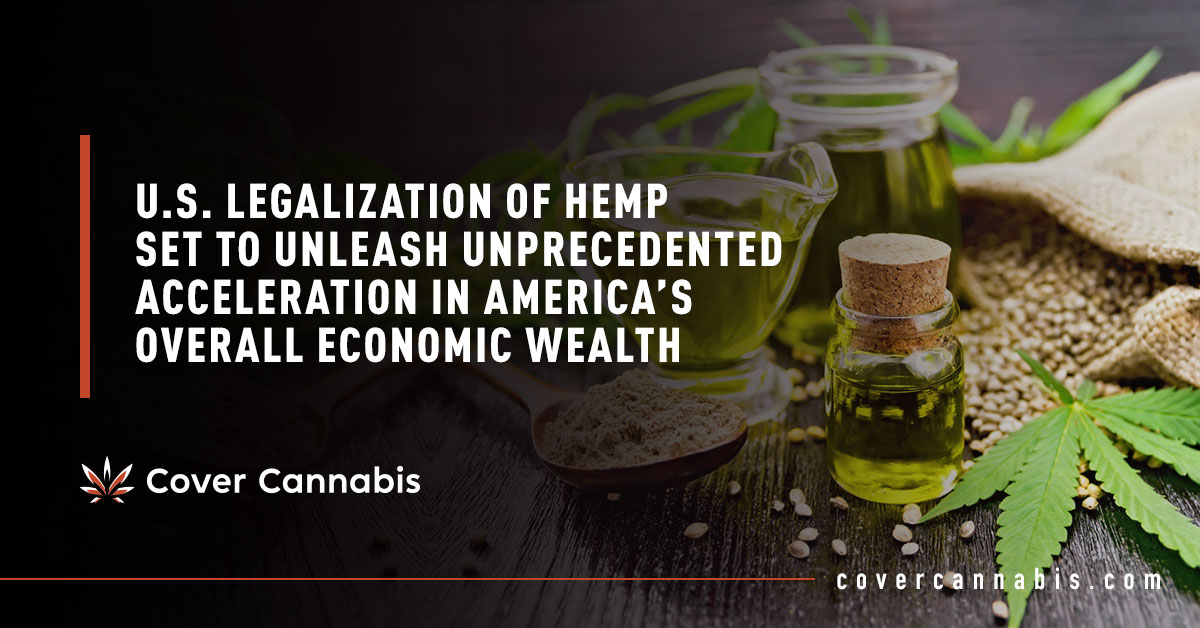The legalization of hemp in the United States has had a significant positive impact on the country’s economy. This article explores how this change has accelerated economic growth and recovery, with a particular focus on the benefits for small and medium-sized businesses in the cannabis industry, including those insured by Cover Cannabis.
The Economic Impact of Hemp Legalization
1. Creation of Jobs
The legalization of hemp has created numerous job opportunities across various sectors, including agriculture, manufacturing, retail, and services.
- Agriculture: Farmers have diversified their crops, leading to increased employment in farming communities.
- Manufacturing: The production of hemp-based products has led to the establishment of new factories and processing plants.
- Retail and Services: The growth of hemp-related businesses has created jobs in sales, marketing, and other service industries.
2. Boost in Agricultural Revenue
Hemp is a versatile crop that can be used to produce a wide range of products, including textiles, paper, bioplastics, and health supplements. This versatility has provided farmers with a profitable alternative to traditional crops, increasing agricultural revenue and contributing to rural economic development.
3. Innovation and Entrepreneurship
The legalization of hemp has spurred innovation and entrepreneurship. Small and medium-sized businesses, supported by insurance providers like Cover Cannabis, have emerged to capitalize on the growing demand for hemp products. These businesses are developing new products, entering new markets, and driving economic growth.

Benefits to Small and Medium-Sized Businesses
1. Access to Insurance
Cover Cannabis specializes in providing insurance for small and medium-sized businesses in the cannabis industry. This access to insurance has given businesses the security they need to invest in growth and expansion.
2. Increased Market Opportunities
Legalization has opened up new market opportunities for businesses involved in the production, distribution, and sale of hemp products. Companies can now legally market their products to a broader audience, both domestically and internationally.
3. Financial Support and Investment
The hemp industry has attracted significant investment from venture capitalists and private investors. This influx of capital has enabled small and medium-sized businesses to scale operations, innovate, and compete in the global market.
Frequently Asked Questions (FAQs)
Q: What is hemp, and how is it different from marijuana?
A: Hemp is a variety of the Cannabis sativa plant species that is grown specifically for industrial use. It contains very low levels of THC, the psychoactive compound found in marijuana, making it non-intoxicating and legal for production and sale.
Q: How has hemp legalization affected the U.S. economy?
A: Hemp legalization has created jobs, boosted agricultural revenue, and spurred innovation and entrepreneurship. It has also opened up new market opportunities and attracted significant investment.
Q: What role does Cover Cannabis play in the hemp industry?
A: Cover Cannabis provides insurance solutions for small and medium-sized businesses in the cannabis industry, giving them the security and support needed to grow and succeed.
Q: What types of products are made from hemp?
A: Hemp is used to produce a wide range of products, including textiles, paper, bioplastics, health supplements, and more.

Conclusion
The legalization of hemp in the U.S. has been a game-changer for the economy, creating jobs, boosting agricultural revenue, and fostering innovation. Small and medium-sized businesses, with the support of insurance providers like Cover Cannabis, are at the forefront of this economic transformation. As the industry continues to grow, the positive impact of hemp legalization on America’s economic wealth and progress will become even more apparent.
Sources and Citations
- U.S. Department of Agriculture. “Hemp Production and Employment Statistics.” Accessed May 12, 2024. USDA Hemp Statistics
- Congressional Research Service. “Hemp as an Agricultural Commodity.” Accessed May 12, 2024. CRS Hemp Report
- Cover Cannabis. “Cannabis Insurance for Small and Medium-Sized Businesses.” Accessed May 12, 2024. Cover Cannabis
The legalization of hemp has not only revitalized the agricultural sector but has also provided a fertile ground for innovation and entrepreneurship, making it a vital contributor to America’s economic resurgence.


